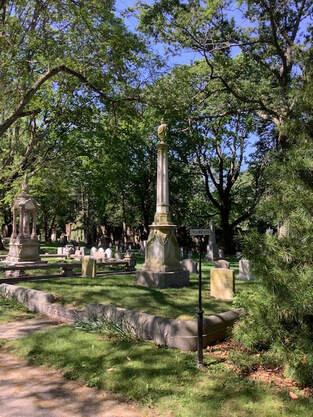 Morton's monument, erected by the citizens of Boston.
Morton's monument, erected by the citizens of Boston. Yesterday I rose early and headed over to Mount Auburn Cemetery in Cambridge to look for the graves of two key figures in the 1846 discovery and implementation of sulfuric ether, which rendered surgery painless and ushered in a new era of medicine. It was about 80 degrees at 8 a.m., so with a minimum of dilly-dallying I located the burial sites of W.T.G. Morton and Charles Thomas Jackson, M.D. Instrumental in this search was a map found in a 2011 issue of the Bulletin of Anesthesia History. Just another Sunday morning ramble...actually yesterday's adventure flowed from a book I had just finished, Ether Day by J. M. Fenster (2002), as well as my personal experience of having undergone several surgeries, most recently a spine operation called a laminectomy.
Next I scooted to Trader Joe's and then home. Soon enough, temperatures hit 93 degrees, pretty hot in these parts but not a record. On June 6, 1925, Boston wilted in 100-degree air. But records were broken yesterday in Burlington, Vermont; Newark, New Jersey; and Syracuse, New York. The day before, Minneapolis soared to a daily record of 99 degrees, and before that Las Vegas broke its June 3rd record with a reading of 108 degrees at 4:45 p.m. at the airport where tourists get off air-conditioned planes to ride air-conditioned transport to air-conditioned hotels and casinos where they are plied with alcohol and gently separated from their money.
Yes, such records are at least partly related to climate change. (Here we pause for a data point: the recent all-time high reading of carbon dioxide in the atmosphere, 419 ppm, taken by instruments atop the Mauna Loa volcano in Hawaii.) And, of course, more frequent and intense heat waves only induce folks to crank more air conditioning which means more burning of fossil fuels, which produces higher temperatures via climate change, and 'round and 'round we go on the Armageddon Carousel.
Next I scooted to Trader Joe's and then home. Soon enough, temperatures hit 93 degrees, pretty hot in these parts but not a record. On June 6, 1925, Boston wilted in 100-degree air. But records were broken yesterday in Burlington, Vermont; Newark, New Jersey; and Syracuse, New York. The day before, Minneapolis soared to a daily record of 99 degrees, and before that Las Vegas broke its June 3rd record with a reading of 108 degrees at 4:45 p.m. at the airport where tourists get off air-conditioned planes to ride air-conditioned transport to air-conditioned hotels and casinos where they are plied with alcohol and gently separated from their money.
Yes, such records are at least partly related to climate change. (Here we pause for a data point: the recent all-time high reading of carbon dioxide in the atmosphere, 419 ppm, taken by instruments atop the Mauna Loa volcano in Hawaii.) And, of course, more frequent and intense heat waves only induce folks to crank more air conditioning which means more burning of fossil fuels, which produces higher temperatures via climate change, and 'round and 'round we go on the Armageddon Carousel.
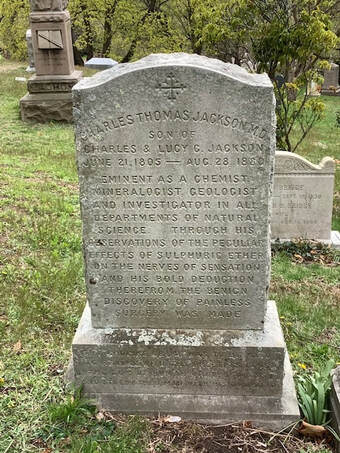 Dr. Jackson, getting in the last word.
Dr. Jackson, getting in the last word. But that's not the gist of what I'm struggling to communicate here. I'm wondering, actually, how major changes occur.
Sometimes it's sudden and surprising, as with anesthesia. One day, surgery exists as a painful and often fatal horror show. Then, within a very short time, a few plucky people harness the power of existing chemical compounds and surgery becomes a painless procedure with boundless potential. Human suffering is lessened greatly. No matter that the major players scrapped so desperately over credit for the epic discovery that they destroyed themselves. No matter that Jackson was an obnoxious snob, Morton a scheming conman. And to heck with their motivations: they did it. They unburdened multitudes, born and unborn. We should note, too, that the rivals received help from several fascinating and faulty characters also buried in the leafy confines of Mount Auburn Cemetery.
But it's not likely, alas, that climate change will be solved with a "game-changing" discovery; sorry, John Kerry. The clock is tick-tick-ticking; temps are rise-rise-rising. Waiting for some undiscovered technology that will, say, whisk greenhouse gases from the atmosphere seems a sucker's bet. More so, while 19th century surgeons eagerly adopted anesthesia, 21st century protectors of the fossil-fuel status quo have so far failed to end their destructive practices and embrace existing and affordable clean energy solutions such as wind and solar.
If this scourge is to be tamed, we may well need millions of Jacksons and millions of Mortons, all over the world, each doing their small part. The alternative is pain, and more pain.
Sometimes it's sudden and surprising, as with anesthesia. One day, surgery exists as a painful and often fatal horror show. Then, within a very short time, a few plucky people harness the power of existing chemical compounds and surgery becomes a painless procedure with boundless potential. Human suffering is lessened greatly. No matter that the major players scrapped so desperately over credit for the epic discovery that they destroyed themselves. No matter that Jackson was an obnoxious snob, Morton a scheming conman. And to heck with their motivations: they did it. They unburdened multitudes, born and unborn. We should note, too, that the rivals received help from several fascinating and faulty characters also buried in the leafy confines of Mount Auburn Cemetery.
But it's not likely, alas, that climate change will be solved with a "game-changing" discovery; sorry, John Kerry. The clock is tick-tick-ticking; temps are rise-rise-rising. Waiting for some undiscovered technology that will, say, whisk greenhouse gases from the atmosphere seems a sucker's bet. More so, while 19th century surgeons eagerly adopted anesthesia, 21st century protectors of the fossil-fuel status quo have so far failed to end their destructive practices and embrace existing and affordable clean energy solutions such as wind and solar.
If this scourge is to be tamed, we may well need millions of Jacksons and millions of Mortons, all over the world, each doing their small part. The alternative is pain, and more pain.

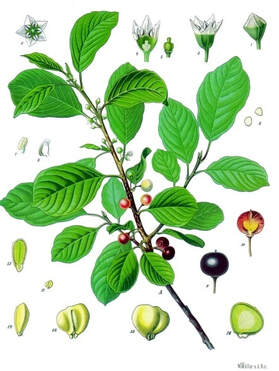
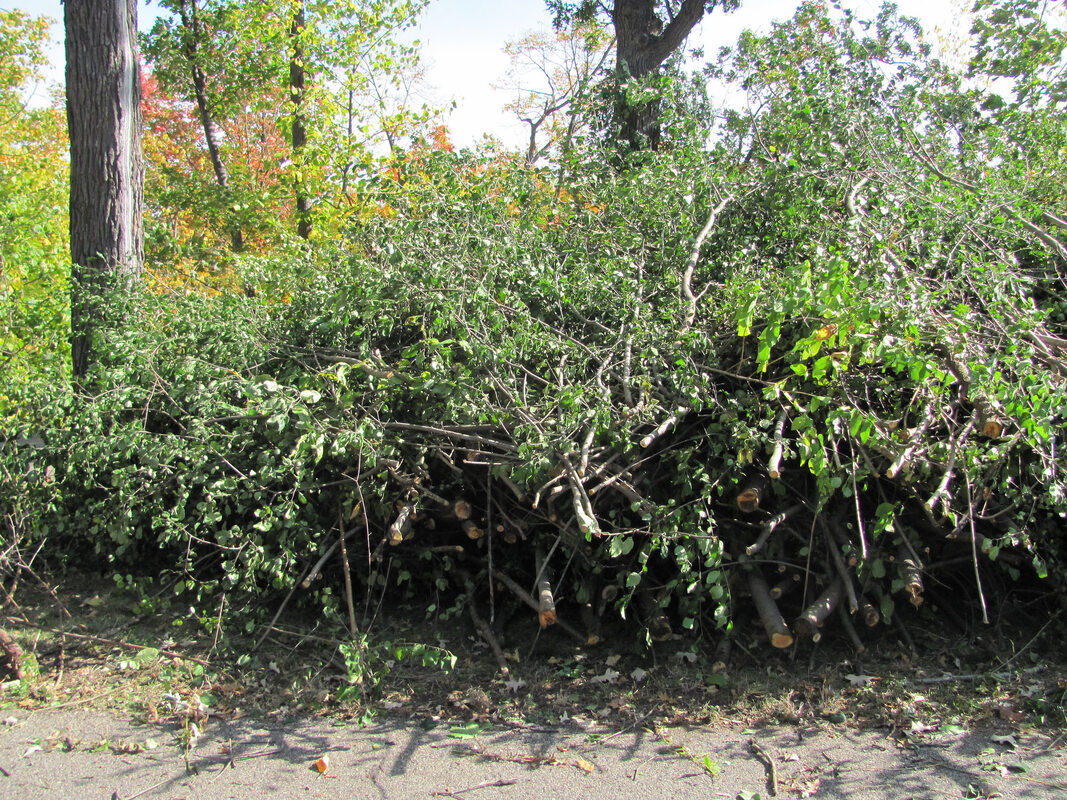

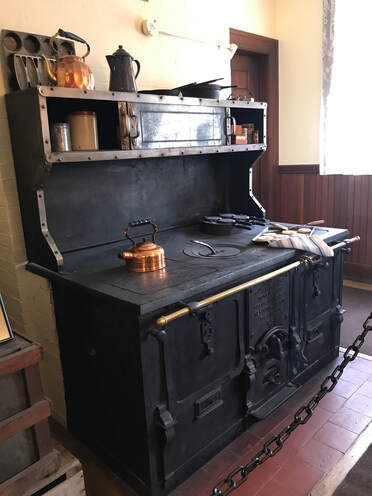
 RSS Feed
RSS Feed